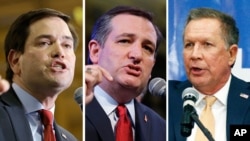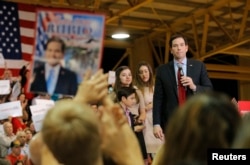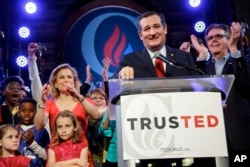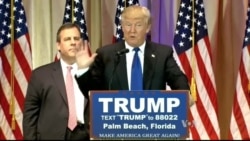The Republican Party struggled with a new reality Wednesday after voters in a diverse array of states clearly signaled their support for Donald Trump as the party's nominee. The results set up a difficult choice for party leaders, donors and voters: allow Trump's unorthodox and sometimes offensive beliefs to redefine the party, or risk heading into the general election without a candidate to support.
Trump argued for party unity in a victory speech Tuesday night, saying "the Republican party has become more dynamic, more diverse. We're taking from the Democrats, we're taking from the independents. We have a lot more people."
But many Republicans see that redefinition as a complete dilution of the party's message. They say Trump's offensive statements on the Ku Klux Klan, Muslims, undocumented immigrants and women do not represent their beliefs.
The choice "cuts to the core of not only what the party believes but who it feels is within its coalition," said John Hudak, a senior fellow at the Brookings Institution.
The Super Tuesday results not only solidified Trump's lead, the voting also narrowed options for his opponents. Republican strategist John Feehery summed up the difficult choice. "Party leaders are going to try to make a distinction in their own minds — who is worse, and then keep going with the other guy," he said.
Trump alternatives
In the days leading up to Super Tuesday, Marco Rubio positioned his candidacy as the Republican establishment alternative to Trump. But he struggled to clear the 20 percent threshold needed in many states to win delegates, and only won Minnesota — his first and sole first-place finish in the primary contest season.
"Rubio's night on Super Tuesday was quite embarrassing," Hudak said.
Instead, Ted Cruz's wins in Oklahoma, Alaska and his home state of Texas positioned his faltering campaign as the leading alternative to Trump. Cruz has often mentioned that he is the only candidate to beat Trump in a head-to-head contest, but his path forward is narrow.
"He doesn't have much institutional support. He's not liked among his colleagues in the Senate," Hudak said. "He's going to have a tough time rallying Republicans."
Ohio governor John Kasich shows no signs of leaving the race, despite trailing significantly in delegate totals. Kasich hopes the geographic shift to voting in Midwestern states will play to his strengths. Retired neurosurgeon Ben Carson said Wednesday he does not "see a political path forward" after the Super Tuesday results.
As Feehery notes, the dysfunction in the Republican Party benefits candidates who haven't made a strong case with voters.
"There's nothing chasing them out other than the hopes and expectations of a political establishment that doesn't have any power anymore," Feehery said.
Convention hopes
The confusion could extend all the way to July, when the Republican Party holds its nominating convention in Cleveland.
Hudak noted there is no hope now for Cruz or Rubio to win the nomination by a delegate count, but they could find an opening if Trump holds a significant share of delegates without winning the 1,237 needed to secure the nomination.
"The only hope right now is for a brokered convention," Hudak said. "But that comes with a cost. Imagine the backlash that Trump supporters are going to mount and that Trump himself will mount if the nomination is taken from him."
WATCH: Trump, Clinton move closer to nominations
The hashtag #NeverTrump has been trending on social media in recent days and speaks to the impossible choice facing many voters: vote for a candidate they deeply dislike, don't vote at all or find a third option.
Former New York City Mayor Michael Bloomberg has mentioned the possibility of a third-party run, and some analysts see room in the 2016 race for a conservative Republican candidate to run if Trump becomes the nominee. But a further split of an already divided Republican party could have a disastrous impact in November.
"If Republicans mount a third-party challenge to Donald Trump, all it does is make Hillary Clinton's electoral college numbers rise dramatically,’ Hudak said. “She will walk into the White House without needing to campaign that hard, if Republicans divide that dramatically."








